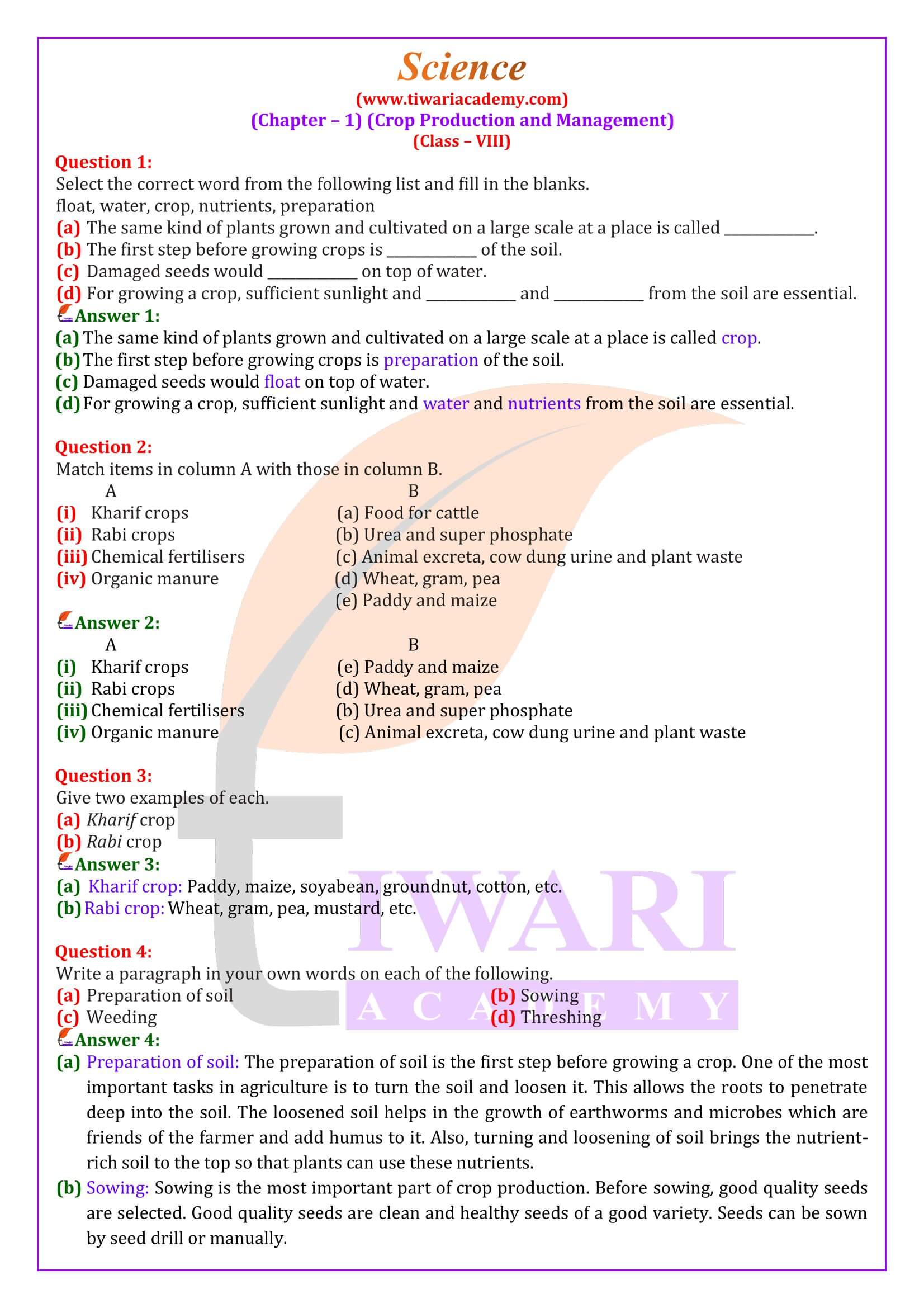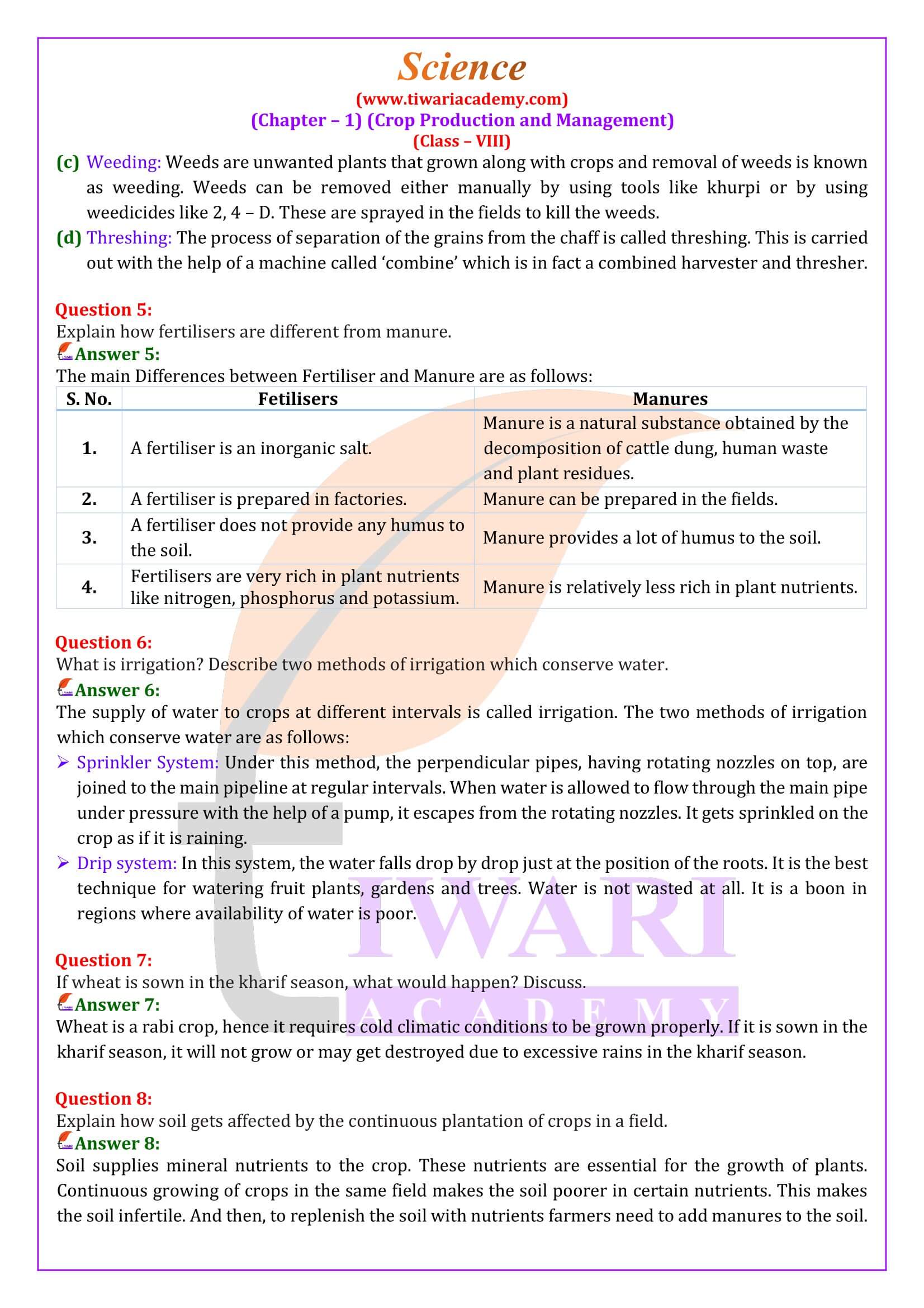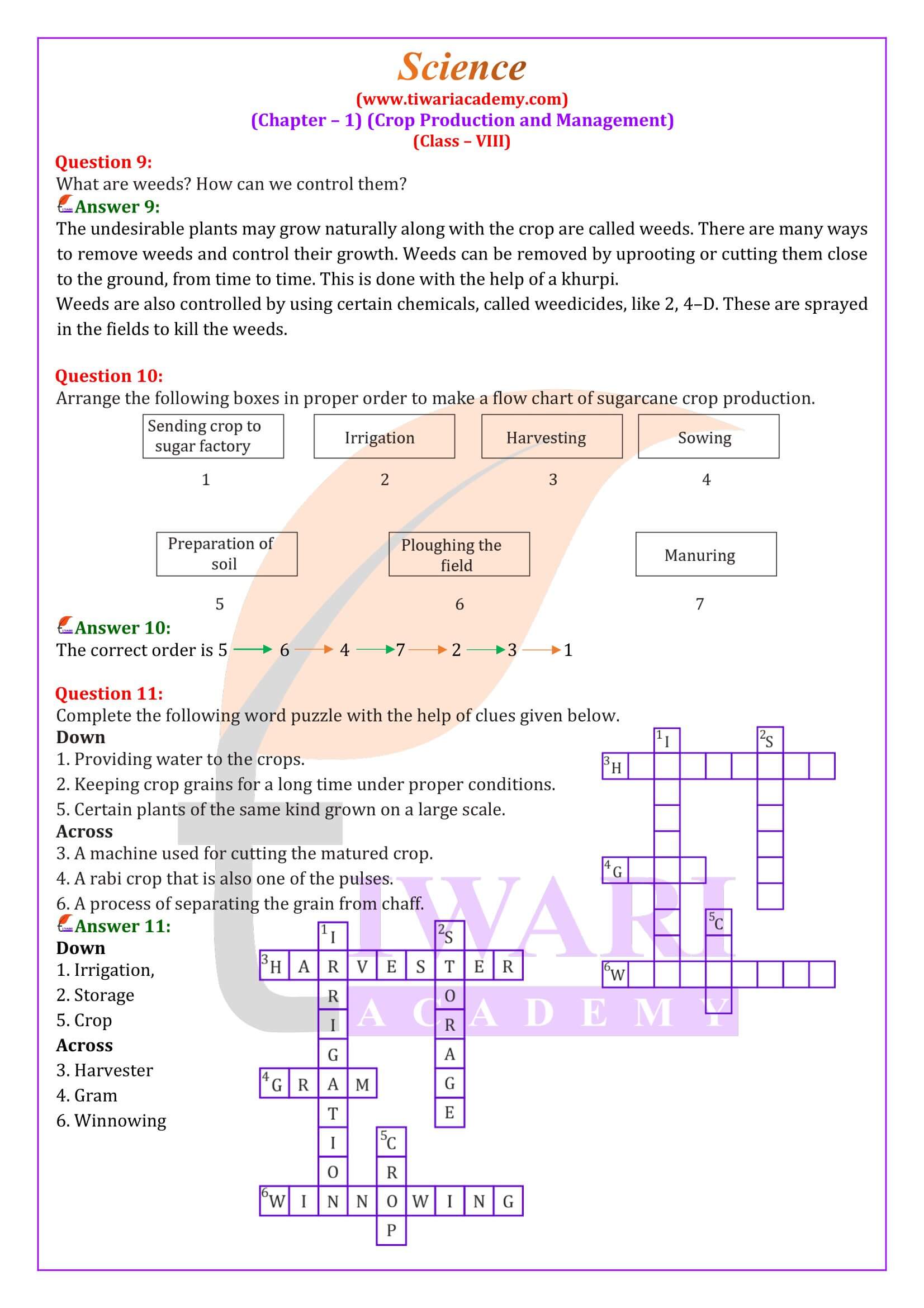Question Wise Class 8 Science Chapter 1 Solutions
Class 8 Science Chapter 1 NCERT Answers
Class 8 Science Chapter 1 in Hindi Medium
Class 8 Science Chapter 1 Extra Questions
Class 8 Science Chapter 1 MCQ
Class 8 Science NCERT Book Download
Class 8 Science Chapter 1 Exemplar Book
Class 8 Science Chapter 1 Exemplar Answers
Class 8 Science NCERT Solutions
Class 8 all Subjects NCERT Solutions
NCERT Solutions for Class 8 Science Chapter 1 Crop Production and Management in English and Hindi Medium or download in PDF file format updated for new academic session 2025-26 based on new NCERT Books. NCERT Solutions 2025-26 of other subjects are also available. Class 8 Science chapter 1 question answers are revised as per the new NCERT textbooks published for 2025-26 exams.
| Class: 8 | Science |
| Chapter 1: | Crop Production and Management |
| Content: | Solutions, MCQ and Extra Questions |
| Content Type: | PDF, Text and Videos |
| Academic Session: | 2025-26 |
| Medium: | English and Hindi Medium |
Class 8 Science Chapter 1 NCERT Solutions
- Class 8 Science Chapter 1 Question Answers
- Class 8 Science Chapter 1 in Hindi Medium
- Class 8 Science Chapter 1 Extra Questions
- Class 8 Science Chapter 1 MCQ
- Class 8 Science Chapter 1 NCERT Book
- Class 8 Science Chapter 1 Exemplar Book
- Class 8 Science Chapter 1 Exemplar Answers
- Class 8 Science NCERT Solutions
- Class 8 all Subjects NCERT Solutions
Class 8 Science Chapter 1 Answers
CBSE NCERT Solutions for Class 8 Science Chapter 1 Crop Production and Management is given below to download free in PDF. Video Format solution is also available for free. Download 8 Science App for offline use. All the solutions are updated for new session 2025-26.
Class 8 Science Chapter 1 Explanation in Video
Important Terms on Class 8 Science Chapter 1
1. Agricultural Practices
In this part of the content focuses how agricultural practices provide food for us with the science needed for adaptation in agriculture systems as well as the impacts of climate change, on food production systems and to develop strategies. You have learnt that all living organisms require food. We get energy from food, and it is utilised by organisms for carrying out their various body functions. Such as digestion, respiration, excretion etc.
In order to provide food for a large population agriculture practices are needed. Generally, the ‘Crop’ refers, when the plants of the same kind are grown and cultivated at one place on a large scale, called crop. Cereals, vegetables and fruits are known as different types of crop. Remember, “wheat” was the first crop that the human started growing. Do you know that the climatic conditions like temperature, humidity and rainfall vary from one region to another? Despite this diversity, two broad cropping patterns can be identified as Kharif crops and Rabi crops.
2. Basic Practices of Crop Production
In this part of chapter 1 of Class 8 Science, introduces the conventional agricultural practices with modern values that are adopted by the Indian farmers. Cultivation of crops involves several activities undertaken by farmers over a while. These activities or task are referred to as ‘Agriculture Practices’. Such as preparation of soil, sowing, it is adding manure and fertilisers, irrigation, protecting from weeds, harvesting and storage of food crops.
3. Preparation of Soil
In this part of the content describes the system of agricultural practices which is essential for crop production and its growth. The preparation of the soil is the first step before growing a crop. One of the most critical tasks in agriculture is to turn the soil and loosen it, called ploughing or tilling. But why does the soil need to be turned and loosen?
You have learnt that soil contains minerals, water, air, dead plants and animals and some living microorganisms. And the living organisms help to decompose that dead plants and animals. As a result, various nutrients are released back into the soil. These nutrients are again absorbed by the plants. As you can see, the turning and loosening of soil are essential for the cultivation of crops.
4. Sowing
Remember, sometimes manure is added to the soil before tilling. You may know that, before sowing the seeds, it is necessary to break the soil to the size of grains to get better yield. Sowing is an essential part of crop production. But why? Without sowing any seed, we cannot get any plants, and without any plants, we never get food grains from them. Remember, before sowing; good quality seeds are selected. Farmers prefer to use seeds which gave a high yield. And the appropriate distance between the seeds is also important to avoid overcrowding of plants. In this way every seed can get proper food, air and light for growth.
5. Adding Manure and Fertilisers
In this part of the chapter focuses on the importance of adding manure in the field of crop. You may saw that healthy crop growing on some farm, but in the neighbouring farm, the plants were weak. What is the reason behind that some plants grow better than others? Your answer will be due to fertilisers or manure. The substances which are added to the soil in the form of nutrients for the healthy growth of plants are called ‘Manure’ and ‘Fertilizers’. You learnt that soil supplies many mineral nutrients to the crop. The continuous growing of crops makes the soil weaker in particular nutrients. Therefore, farmers added manure to the fields to replenish the soil with nutrients.
6. The Differences between ‘Manure’ and ‘Fertilizers’
Manure is an organic substance obtained from the decomposition of plant or animal wastes. The decomposed matter is used as organic manure. Moreover, fertilizers are chemical substances which are rich in a particular nutrient. Such as Urea, Potash, Ammonium sulphate etc. You are surprised to know that fertilizers have also become a source of water pollution. Hence, the other method of replenishing the soil with nutrients is through crop rotation. That means growing different crops alternately.
7. Irrigation
As you know, all living beings need water to live in. Water is essential for proper growth and development of flowers, fruits and seeds germination. And water is absorbed by the root of the plants. The supply of water to crops at different intervals is called ‘Irrigation’. Do you know, what are the sources of irrigations? Wells, ponds, dams, rivers, canals, and so many other water sources. In summer the plant needs more water. Do you know why? Generally, in the summer rate of evaporation of water is higher from the soil and the leaves.
8. Modern Methods of Irrigation
Sprinkler systems are more useful than traditional systems on the uneven land where sufficient water is not available. It gets sprinkled on the crops as if it is raining. The sprinkler is very useful for sandy soil. In the other system, where the waterfalls drop by drop just at the position of the roots, called ‘Drip System’. It is a boon in that region where the availability of water is poor.
9. Protection from Weeds
You observed that, in many fields, undesirable plants grow along with the crop. These undesirable plants are called ‘Weeds’. Do you know why removing these weeds are necessary? Wedding is necessary because they compete with the crop plants for water, nutrient, space and light. Thus, they affect the growth of the crop.
10. Harvesting
The cutting of crop after its maturity called harvesting. It usually takes three to four months for a cereal crop to mature. In India, the period of harvest celebrated as Pongal, Baisakhi, Holi, Diwali and other festivals with great joy and happiness. In the harvested crop, the grain seeds need to be separated from the stalks. This process is known as ‘threshing’. And after that, the winnowing process is followed by the farmers.
11. Storage
The cutting of crop after its maturity called harvesting. It usually takes three to four months for a cereal crop to mature. In India, the period of harvest celebrated as Pongal, Baisakhi, Holi, Diwali and other festivals with great joy and happiness. In the harvested crop, the grain seeds need to be separated from the stalks. This process is known as ‘threshing’. And after that, the winnowing process is followed by the farmers.
Important Questions on Class 8 Science Chapter 1 for Practice
8th Science Chapter 1 Extra Questions
If wheat is sown in the kharif season, what would happen? Discuss.
Wheat is a rabi crop, hence it requires cold climatic conditions to be grown properly. If it is sown in the kharif season, it will not grow or may get destroyed due to excessive rains in the kharif season.
Explain how soil gets affected by the continuous plantation of crops in a field.
Soil supplies mineral nutrients to the crop. These nutrients are essential for the growth of plants. Continuous growing of crops in the same field makes the soil poorer in certain nutrients. This makes the soil infertile. And then, to replenish the soil with nutrients farmers need to add manures to the soil.
What are weeds? How can we control them?
The undesirable plants may grow naturally along with the crop are called weeds. There are many ways to remove weeds and control their growth. Weeds can be removed by uprooting or cutting them close to the ground, from time to time. This is done with the help of a khurpi.
Weeds are also controlled by using certain chemicals, called weedicides, like 2, 4–D. These are sprayed in the fields to kill the weeds.
What is irrigation? Describe two methods of irrigation which conserve water.
The supply of water to crops at different intervals is called irrigation. The two methods of irrigation which conserve water are as follows:
(i) Sprinkler System:
Under this method, the perpendicular pipes, having rotating nozzles on top, are joined to the main pipeline at regular intervals. When water is allowed to flow through the main pipe under pressure with the help of a pump, it escapes from the rotating nozzles. It gets sprinkled on the crop as if it is raining.
(ii) Drip system:
In this system, the water falls drop by drop just at the position of the roots. It is the best technique for watering fruit plants, gardens and trees. Water is not wasted at all. It is a boon in regions where availability of water is poor.
Class 8 Science Chapter 1 MCQ with answers
1. Which one of the following condition is not essential to grow maize?
(a) High temperature
(c) Low temperature
(b) Humidity
(d) Rainfall
2. The system of irrigation where in water is supplied drop by drop near the roots of plants, is called
(a) pulley system
(b) drip system
(c) sprinkler system
(d) lever system
3. The term used for the process of separation of grains from chaff is
(a) sieving
(b) threshing
(c) winnowing
(d) hand picking
4. Which of the following tools would a farmer use to remove weeds from the field?
(a) Hoe
(b) Plough
(c) Axe
(d) Cultivator
5. Which of the following statement is not true for organic manure?
(a) It enhances water holding capacity of soil.
(b) It has a balance of all plant nutrients.
(c) It provides humus to soil.
(d) It improves texture of soil.
6. Which of the following is not true for fertilisers?
(a) They increase the yield.
(b) Their excessive use disturbs the balance of nutrients in soil.
(c) They are generally used in small quantity.
(d) They are environment friendly.
7. Read the statements given below.
(i) Seeds require moisture for germination.
(ii) Plants can absorb nutrients mostly in dissolved form.
(iii) Irrigation protects crops from both frost and hot air currents.
(iv) Irrigation improves soil texture.
Choose the combination of statements which indicate the need to irrigate crops.
(a) i and ii
(b) i, ii, iii
(c) i, ii, iii, iv
(d) i and iii
8. Given below are statements about the harmful effects of weeds on crop plants.
(i) They interfere in harvesting.
(ii) They help crop plants to grow healthily.
(iii) They compete with crop plants for water, nutrients, space and light.
(iv) They affect plant growth.
Choose the correct combination of statements.
(a) i, iii, iv
(b) iii only
(c) iii, iv
(d) i, ii, iii, iv
9. The monsoon season in our country is during the months
(a) April to December
(b) June to September
(c) November to March
(d) January to May
10. The process of loosening and turning of soil is called
(a) irrigation and manuring
(b) digging and winnowing
(c) tilling and ploughing
(d) harvesting and storage
Answers of Important Questions (MCQ)
1 (c)
2 (b)
3 (c)
4 (a)
5 (b)
6 (d)
7 (a)
8 (a)
9 (b)
10 (c).
Download NCERT Books and Offline apps based on new CBSE Syllabus. Ask your doubts and share your knowledge with your friends and other users through Discussion Forum.






